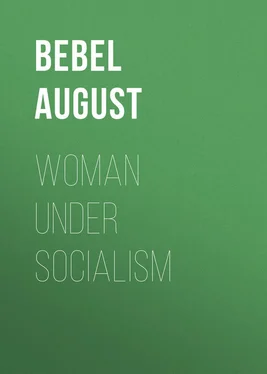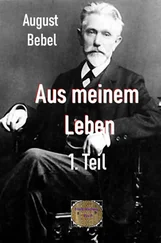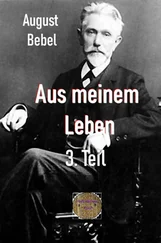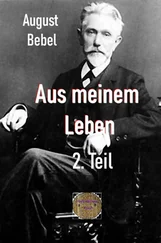August Bebel - Woman under socialism
Здесь есть возможность читать онлайн «August Bebel - Woman under socialism» — ознакомительный отрывок электронной книги совершенно бесплатно, а после прочтения отрывка купить полную версию. В некоторых случаях можно слушать аудио, скачать через торрент в формате fb2 и присутствует краткое содержание. ISBN: , Жанр: foreign_antique, foreign_prose, на английском языке. Описание произведения, (предисловие) а так же отзывы посетителей доступны на портале библиотеки ЛибКат.
- Название:Woman under socialism
- Автор:
- Жанр:
- Год:неизвестен
- ISBN:http://www.gutenberg.org/ebooks/30646
- Рейтинг книги:5 / 5. Голосов: 1
-
Избранное:Добавить в избранное
- Отзывы:
-
Ваша оценка:
- 100
- 1
- 2
- 3
- 4
- 5
Woman under socialism: краткое содержание, описание и аннотация
Предлагаем к чтению аннотацию, описание, краткое содержание или предисловие (зависит от того, что написал сам автор книги «Woman under socialism»). Если вы не нашли необходимую информацию о книге — напишите в комментариях, мы постараемся отыскать её.
Woman under socialism — читать онлайн ознакомительный отрывок
Ниже представлен текст книги, разбитый по страницам. Система сохранения места последней прочитанной страницы, позволяет с удобством читать онлайн бесплатно книгу «Woman under socialism», без необходимости каждый раз заново искать на чём Вы остановились. Поставьте закладку, и сможете в любой момент перейти на страницу, на которой закончили чтение.
Интервал:
Закладка:
Attacks that are objective, and are honestly meant, will be welcome to us. Attacks that violate truth in the presentation of the contents of this book, or that rest upon false premises we shall ignore. For the rest, in the following pages all conclusions, even the extremest, will be drawn, which, the facts being verified, the results attained may warrant. Freedom from prejudice is the first condition for the recognition of truth. Only the unrestricted utterance of that which is, and must be, leads to the goal.
PART I
WOMAN IN THE PAST
CHAPTER I.
BEFORE CHRISTIANITY
Woman and the workingman have, since old, had this in common — oppression . The forms of oppression have suffered changes in the course of time, and in various countries. But the oppression always remained. Many a time and oft, in the course of the ages, did the oppressed become conscious of their oppression; and such conscious knowledge of their condition did bring on changes and reliefs. Nevertheless, a knowledge, that grasped the actual feature of the oppression by grasping its causes, is, with woman as with the workingman, the fruit of our own days. The actual feature of society, and of the laws that lie at the bottom of its development, had first to be known, before a general movement could take place for the removal of conditions, recognized as oppressive and unjust. The breadth and intensity of such a movement depends, however, upon the measure of the understanding prevalent among the suffering social layers and circles, and upon the measure of freedom of motion that they enjoy. In both respects, woman stands, through custom and education, as well as the freedom allowed her by law, behind the workingman. To this, another circumstance is added. Conditions, lasting through a long series of generations, finally grow into custom; heredity and education then cause such conditions to appear on both sides as "natural." Hence it comes that, even to-day, woman in particular, accepts her subordinate position as a matter of course. It is no easy matter to make her understand that that position is unworthy, and that it is her duty to endeavor to become a member of society, equal-righted with, and in every sense a peer of man.
However much in common woman may be shown to have with the workingman, she leads him in one thing: — Woman was the first human being to come into bondage: she was a slave before the male slave existed.
All social dependence and oppression has its roots in the economic dependence of the oppressed upon the oppressor. In this condition woman finds herself, from an early day down to our own. The history of the development of human society proves the fact everywhere.
The knowledge of the history of this development is, however, comparatively new. As little as the myth of the Creation of the World – as taught us by the Bible – can be upheld in sight of the investigations of geographers and, scientists, grounded as these investigations are upon unquestionable and innumerable facts, just so untenable has its myth proved concerning the creation and evolution of man. True enough, as yet the veil is far from being lifted from all the sub-departments of this historical development of mankind; over many, on which already light has been shed, differences of opinion still exist among the investigators on the meaning and connection of this or that fact; nevertheless, on the whole, there is agreement and clearness. It is established that man did not, like the first human couple of the Bible, make his first appearance on earth in an advanced stage of civilization. He reached that plane only in the course of endlessly long lapses of time, after he had gradually freed himself from purely animal conditions, and had experienced long terms of development, in the course of which his social as well as his sexual relations – the relations between man and woman – had undergone a great variety of changes.
The favorite phrase – a phrase that the ignorant or impostors daily smite our ears with on the subject of the relations between man and woman, and between the poor and the rich – "it always has been so," and the conclusion drawn therefrom – "it will always be so," is in every sense of the word false, superficial and trumped-up .
For the purposes of this work a cursory presentation of the relations between the sexes, since primitive society, is of special importance. It is so because it can thereby be proved that, seeing that these relations have materially changed in the previous course of human development, and that the changes have taken place in even step with the existing systems of production, on the one hand, and of the distribution of the product of labor, on the other, it is natural and goes without saying that, along with further changes and revolutions in the system of production and distribution, the relations between the sexes are bound to change again . Nothing is "eternal," either in nature or in human life; eternal only is change and interchange.
As far back as one may go in the development of human society, the horde is found as the first human community. True enough, Honeger mentions in his "General History of Civilization" that even to-day in the little explored interior of the island of Borneo, there are wild people, living separately; and Huegel likewise maintains that, in the wild mountain regions of India, human couples have been discovered living alone, and who, ape-like, fled to the trees as soon as they were met; but there is no further knowledge on the subject. If verified, these claims would only confirm the previous superstition and hypothesis concerning the development of the human race. The probability is that, wherever human beings sprang up, there were, at first, single couples. Certain it is, however, that so soon as a larger number of beings existed, descended from a common parent stock, they held together in hordes in order that, by their joint efforts, they might, first of all, gain their still very primitive conditions of life and support, as well as to protect themselves against their common enemies, wild animals. Growing numbers and increased difficulties in securing subsistence, which originally consisted in roots, berries and fruit, first led to the splitting up or segmentation of the hordes, and to the search for new habitats.
This almost animal-like state, of which we have no further credible antiquarian proofs, undoubtedly once existed, judging from all that we have learned concerning the several grades of civilization of wild peoples still living, or known to have lived within historic times. Man did not, upon the call of a Creator, step ready-made into existence as a higher product of civilization. It was otherwise. He has had to pass through the most varied stages in an endlessly long and slow process of development. Only via ebbing and flowing periods of civilization, and in constant differentiation with his fellows in all parts of the world, and in all zones, did he gradually climb up to his present height.
Indeed, while in one section of the earth's surface great peoples and nations belong to the most advanced stages of civilization, other peoples are found in different sections standing on the greatest variety of gradations in development. They thus present to us a picture of our own past history; and they point to the road which mankind traversed in the course of its development. If but certain common and generally accepted data are established, that may serve everywhere as sign-posts to guide investigation, a mass of facts will follow, throwing a wholly new light upon the relations of man in the past and the present. A number of social phenomena – unintelligible to us to-day, and attacked by superficial judges as nonsensical, not infrequently even as "immoral" – will become clear and natural. A material lifting of the veil, formerly spread over the history of the development of our race, has been effected through the investigations made, since Bachofen, by a considerable number of scientists, like Tylor, MacLennan, Lubbock and others. Prominently among the men who joined these was Morgan, with his fundamental work, that Frederick Engels further substantiated and supplemented with a series of historical facts, economic and political in their nature, and that, more recently, has been partly confirmed and partly rectified by Cunow. 1
Читать дальшеИнтервал:
Закладка:
Похожие книги на «Woman under socialism»
Представляем Вашему вниманию похожие книги на «Woman under socialism» списком для выбора. Мы отобрали схожую по названию и смыслу литературу в надежде предоставить читателям больше вариантов отыскать новые, интересные, ещё непрочитанные произведения.
Обсуждение, отзывы о книге «Woman under socialism» и просто собственные мнения читателей. Оставьте ваши комментарии, напишите, что Вы думаете о произведении, его смысле или главных героях. Укажите что конкретно понравилось, а что нет, и почему Вы так считаете.












